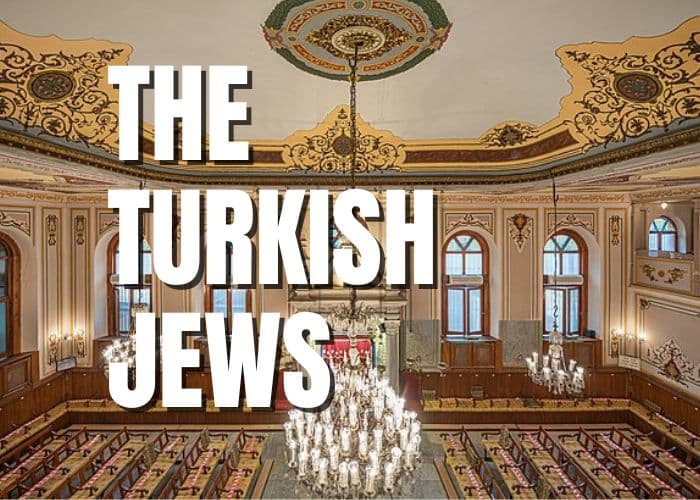Turkish Jews: A Rich History, Vibrant Culture, and Notable Contributions
The Jewish community in Turkey has a rich history spanning over 2,400 years. Turkish Jews are a diverse group, hailing from different parts of the world, but they have developed a unique identity, culture, and cuisine that reflect their Turkish roots and Jewish heritage. In this article, we will explore the history, communities, culture, religious liturgy, and notable people and accomplishments of Turkish Jews.
- History
The first Jewish settlers arrived in Turkey in the 4th century BCE, during the reign of Alexander the Great. Over the centuries, the Jewish community in Turkey grew and thrived, despite periods of persecution and discrimination. During the Ottoman Empire, Jews were protected and granted certain privileges, such as the right to practice their religion and to own property. Many Jews prospered as merchants, traders, and financiers, and they contributed to the cultural and intellectual life of the empire.
In the early 20th century, the rise of nationalism and the decline of the Ottoman Empire brought new challenges to the Jewish community in Turkey. Many Jews migrated to other countries, including Israel, and the community dwindled in size. However, those who remained continued to play an important role in the social, economic, and political life of Turkey.
- Communities Today
Today, there are an estimated 15,000-20,000 Jews living in Turkey, mainly in Istanbul, Izmir, and Ankara. The Jewish community in Turkey is a diverse group, consisting of Sephardic, Ashkenazi, and Romaniote Jews, who trace their roots to different parts of the world. Despite their differences, Turkish Jews share a common history and identity, and they have built strong bonds of solidarity and mutual support.
The Jewish community in Turkey is known for its vibrant cultural life, including music, art, literature, and cuisine. Turkish Jews have adapted to the local culture and traditions, while preserving their Jewish identity and traditions. They have also established close ties with the broader Turkish society, and they have contributed to the cultural and intellectual life of the country.
- Culture
Turkish Jewish culture is a rich blend of Turkish and Jewish traditions, reflecting the long history of the community in Turkey. Turkish Jews have developed a unique cuisine, music, art, and literature that reflect their cultural and religious heritage.
Cuisine: Turkish Jewish cuisine is known for its rich flavors and unique blend of spices, herbs, and vegetables. Popular dishes include borek (a savory pastry), pilaf, kofte (meatballs), and meze (small dishes of appetizers). Jewish holidays are celebrated with special dishes, such as challah bread, matzo ball soup, and sufganiyot (jelly-filled doughnuts).
Music: Turkish Jewish music is a blend of Turkish, Balkan, and Jewish traditions, with a distinctive rhythm and melody. The most popular musical genre is the Sephardic music, which includes songs in Ladino, the traditional language of Sephardic Jews. Turkish Jewish music has influenced the broader Turkish music scene, and it has gained popularity among the younger generation.
Art and Literature: Turkish Jews have produced a rich body of art and literature, reflecting their cultural and religious heritage. Many Jewish artists and writers have gained national and international recognition for their works. Some notable examples include the writer Albert Cohen, the painter Avigdor Arikha, and the filmmaker Elia Kazan.
- Religious Liturgy:
Turkish Jews follow the Sephardic Jewish liturgy, with some adaptations reflecting their own traditions. Their religious services are conducted in the Ladino language, which is a Judeo-Spanish dialect that originated in Spain and was brought to Turkey by the Sephardic Jews who migrated there in the 15th century. The Ladino language has been an integral part of Turkish Jewish culture for centuries, and it is still spoken by some members of the community today.
The most significant religious holiday in the Turkish Jewish calendar is Rosh Hashanah, the Jewish New Year. It is celebrated with special prayers and a festive meal that includes traditional foods like apples dipped in honey, symbolizing hopes for a sweet new year. Other important holidays include Yom Kippur, the Day of Atonement, and Passover, which commemorates the Jewish exodus from Egypt.
- Notable People and Accomplishments:
The Turkish Jewish community has produced many notable people throughout history, including:
- Sabiha Gökçen: The first female combat pilot in the world, who served in the Turkish Air Force and later became a colonel.
- Behiç Erkin: A diplomat who played a key role in establishing diplomatic relations between Turkey and the Soviet Union in the 1920s.
- Jak Kamhi: A prominent businessman and philanthropist who established the Kamhi Foundation, which supports education and culture in Turkey.
- Naim Güleryüz: A celebrated painter who is known for his vibrant and colorful artwork.
- Selim İleri: An award-winning author and journalist who has written extensively about Turkish Jewish culture and history.
- Albert Aji: A chemist who invented the Turkish national drink, boza, which is made from fermented bulgur wheat and has a sweet and sour taste.
These individuals, among many others, have contributed to Turkish society and made significant contributions to their respective fields.
Conclusion:
The history, culture, and traditions of the Turkish Jewish community are rich and diverse, reflecting their unique place in Turkish society. Despite facing challenges throughout their history, the Turkish Jews have maintained their traditions and identity, adapting to changing times while also preserving their heritage. Through their art, literature, cuisine, and other cultural expressions, the Turkish Jews have made significant contributions to the broader Turkish society, enriching the country’s cultural and historical tapestry. As the community continues to evolve and grow, it remains an integral part of Turkey’s diverse cultural landscape.








Ohr HaChaim Yomi – Emor